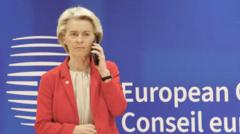The EU's General Court deemed the Commission's denial of requests for text messages regarding Covid-19 vaccine contracts inadequate, labeling it a victory for transparency. This ruling may have reputational implications for Commission President von der Leyen amid calls for greater accountability in public dealings.
EU Court Mandates Release of Ursula von der Leyen's Pfizer Messages

EU Court Mandates Release of Ursula von der Leyen's Pfizer Messages
The European Court has ruled against the European Commission's refusal to disclose text messages between Ursula von der Leyen and Pfizer CEO Albert Bourla concerning Covid vaccine negotiations.
The European Commission has suffered a setback after the EU's General Court ruled it was wrong to deny the release of text messages sent by Ursula von der Leyen to Pfizer CEO Albert Bourla during negotiations related to Covid-19 vaccines. This decision stems from a request made by an investigative journalist back in 2021, seeking insights into the communications between the Commission's President and Pfizer's leadership at a time when the company inked contracts amounting to billions of euros with the EU, including a significant agreement for an additional 1.8 billion doses.
The court's verdict highlights the Commission's failure to provide a credible rationale for withholding these communications, which have since garnered significant public and media interest, often referred to as "Pfizergate" in Brussels. Transparency International has applauded the ruling as a significant landmark for the EU's transparency movement, calling for a shift away from the "restrictive attitude to freedom of information" historically exhibited by the Commission.
While Ursula von der Leyen has held the presidency since 2019 and successfully secured a new mandate late last year, this ruling could potentially tarnish her reputation alongside the ongoing scrutiny regarding her role in the Pfizer vaccine negotiations. The Commission, in light of this ruling, stated that it would examine the court's decision closely while affirming that transparency has always been a priority.
The issue gained traction in April 2021 when a report emerged revealing von der Leyen's private discussions with Bourla following the approval of Pfizer's vaccine developed with BioNTech. The matter escalated as journalist Alexander Fanta submitted a Freedom of Information request to obtain related text messages from January 2021 to May 2022, only to be rebuffed by the Commission, which claimed it lacked the necessary documents.
This explanation led to an inquiry by the European Ombudsman, which criticized the Commission's shortcomings in searching beyond traditional record-keeping practices for the relevant text messages. Ultimately, as the New York Times and Fanta pursued further action, the court found that the Commission had relied on flawed assumptions regarding public accessibility of such messages, placing the onus on the Commission to demonstrate the existence or non-existence of the requested documents.
Moreover, the court declared that the Commission failed to clarify whether any pertinent text messages had been deleted or if von der Leyen had altered her mobile phone, factors that may further complicate the transparency issues surrounding the vaccine negotiations.





















